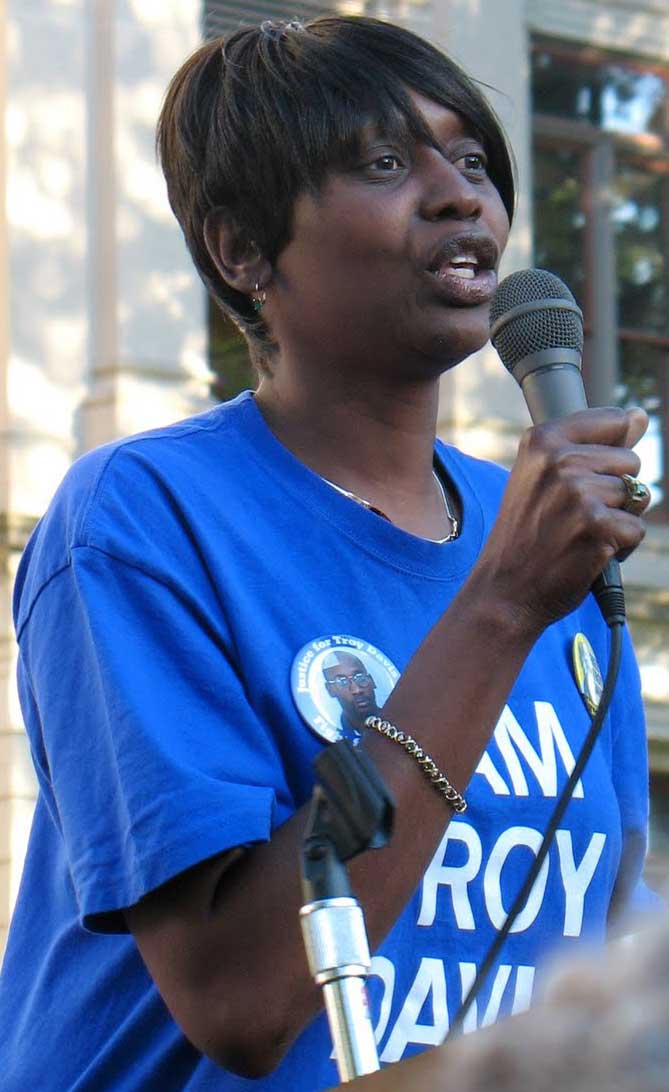The Locked Gate: Standing
Up for My Brother on Death Row
My brother and I don’t always agree,
but I defend his innocence, and I’ll never walk out on him again.
by Martina Davis-Correia, as told to
Yes! Magazine,
May 10, 2011
 |
Twenty years ago, Troy Davis
was convicted of murdering a police officer and sentenced to
death. Davis maintains his innocence, and his family, including
sister Martina Davis-Correia, have appealed the case with help
from Amnesty International. Davis’ final appeal was denied by
the U.S. Supreme Court, paving the way for the state of Georgia
to set an execution date. Information about the case, and to sign a petition to help save Troy: justicefortroy.org Mama, my younger sister Kim, and I were visiting my brother, Troy, like we did most weekends. Inside the prison in Jackson, Ga., death-row inmates and family members sat in a narrow corridor, a locked door with yellow bars and a guard separating us from the non-death-row inmates and their visitors. |
After Troy and I went over the latest developments in his
case, we started talking about religion. Troy has always prided himself
on knowing as much as he could about all religions. He’s studied the
Bible, the Torah, the Quran, and the Book of Mormon. Troy has friends
from all different religions and ethnic groups, and he wants to
understand all their faiths.
We got into a heated debate
about Bible verses. But when Troy began reciting the Bible to me,
throwing in some passages from the Torah and Quran for good measure, I
got mad. “I don’t have to listen to this!”
I got up, left the prison, and went and sat in the car, pouting, waiting
on Mama and Kim.
The argument wasn’t really about a Bible verse. Most likely I wasn’t
even right about the verse, and I knew it. My daily frustration about
Troy’s case and the legal system just came to a boiling point that day.
I couldn’t get Troy’s lawyers to do what they were supposed to do. They
knew Troy was innocent, but they didn’t have the resources to properly
defend him.
Troy’s sense of impotency ran far deeper. He had no control over his own
life or over Georgia’s justice system, which is trying to kill him.
Every weekend, I sat in there with Troy, while he dissected police
statements and pointed out enormous contradictions and inconsistencies
in witness testimony. He had nothing to do all week long aside from
examining his case file. And he had nowhere else to pour out his
frustrations, except when he was with us. I was trying my best to get
him out of there, trying my best to get someone to listen. And then,
Saturday after Saturday, I had to relive the case with him. My
irritation mounted each time Troy found and parsed a new detail about
his case … how could he have been convicted on such flimsy evidence?
About an hour later, Mama came out to the car. Every few minutes, Troy
had gotten up and gone to the gate looking for me, she said. He thought
maybe I had gone to the restroom and was coming back.
An hour after we got home, the phone rang. It was Troy. He wanted to
apologize to me.
That’s when I realized: I could get up and leave when I felt like it,
and Troy couldn’t. He was powerless to leave, powerless to go after me.
And, frustrated as I was with his case, Troy’s sense of impotency ran
far deeper. He had no control over his own life or over Georgia’s
justice system, which is trying to kill him. And then, on top of it all,
his older sister walked out on him, and he couldn’t do anything other
than twist his neck as far as he could to look out the locked yellow
gate to see if she was coming back.
With everything else stacked against him, he couldn’t stand the thought
that his big sister was angry with him. No wonder Troy called me right
away to tell me he was sorry, even though I had been the one who was
wrong.
I hung up the phone and bawled.
I will never walk out on Troy again. Not unless he is free to come after
me.
Martina Davis-Correia and Jen Marlowe wrote this article for Beyond
Prisons, the Summer 2011 issue of YES! Magazine. Jen is a human rights
activist, author, and documentary filmmaker. She is currently working on
a book with Martina.
|
|
VIDEO AND MORE INFO
HERE.